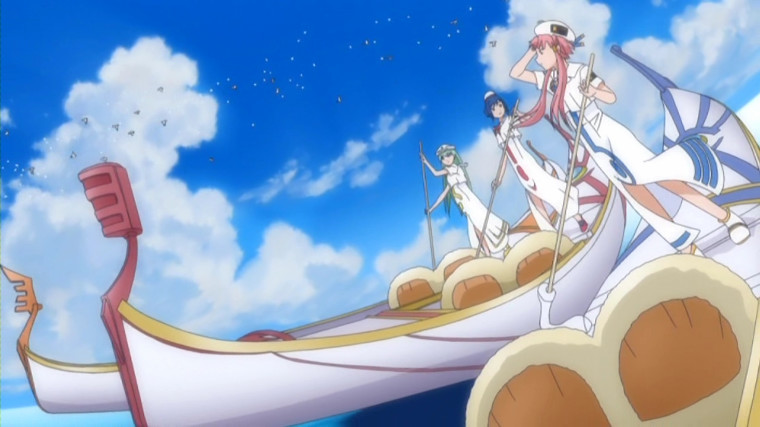 Is Aria the Animation the perfect example of a utopia in anime?
Is Aria the Animation the perfect example of a utopia in anime?
The perfect society and the broken one - utopia and dystopia are two sides of a coin. They also make for excellent plot points and world building, and have both appeared in a number of anime. But where did the ideas come from? And what can you expect from an anime featuring utopian or dystopian societies?
Utopia: Attaining the Impossible
The term utopia probably brings up images of a perfect society. Crime has been eliminated and everyone is happy. It's the very definition of "perfect," and probably what you assume would happen if we ever achieved "peace on Earth." But what is a utopia, really?
Utopia in Classic Literature
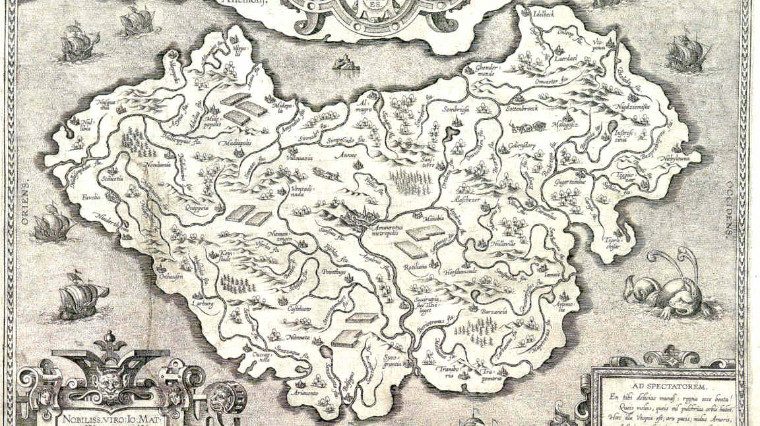 A map of Sir Thomas More's Utopia, from his book by the same name.
A map of Sir Thomas More's Utopia, from his book by the same name.
As much as you wish we could live in a utopia, even the creator of the word realized it was impossible. Sir Thomas More coined the term in 1516, to mean "an imaginary place," or literally translated from the Latin, "No Place." The idea of the perfect society was created solely to have a point of comparison for the decidedly flawed conditions in Europe at the time.
Over time, the term stopped meaning "an imaginary perfect place" and became just "a perfect place." After all, utopia gives us something to strive for.
More may have been the first to give the idea of a perfect society a name, but he was not the first to dream about it. Way before More, around 380 BC, the philosopher Plato wrote The Republic. In it, Plato outlined the idea of a perfect society, ruled by philosopher kings that was equal to all. Even Plato's incredibly detailed vision for a utopian society falls apart upon closer inspection, though: Plato's utopia relies on a system of slavery to keep everything running smoothly, and the residents' biggest joy is being healthy. That doesn't quite sound like perfection to us.
Utopia in Anime
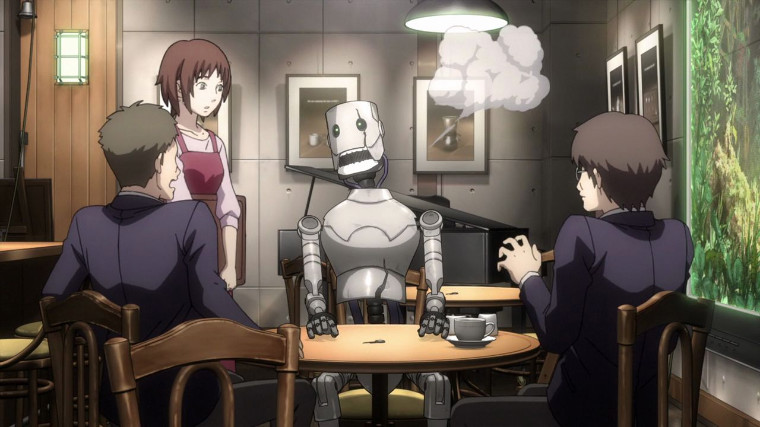 Is Eve no Jikan truly a utopia? Depends on how you look at it.
Is Eve no Jikan truly a utopia? Depends on how you look at it.
We might see utopia as something attainable, but there's one major obstacle standing in our way: human nature. Even when we're presented with something "perfect," it makes us uneasy. Like Plato's Republic, we tend to assume that if something is perfect on the outside, there has to be something hidden - and dark - running it from behind the scenes.
Maybe that's why most anime that depict utopian societies actually turn out to be dystopian (but more on that in a bit). There are only a handful of true utopian societies in anime. Because let's face it, watching perfection is not fun unless we can expect it to fall apart at some point.
Still, some anime manage to keep up the utopian image without descending too far into darkness. There's no better example of utopia in anime than Aria the Animation. Aria's planet Aqua is built on dreams and miracles. It is breathtakingly gorgeous, slow-paced and welcoming, and populated by good-hearted people who value the small things in life. Even though the utopian Aqua is built from the ashes of the ruined Earth, it's refreshing to see a society that learned from its mistakes and didn't squander its second chance at perfection.
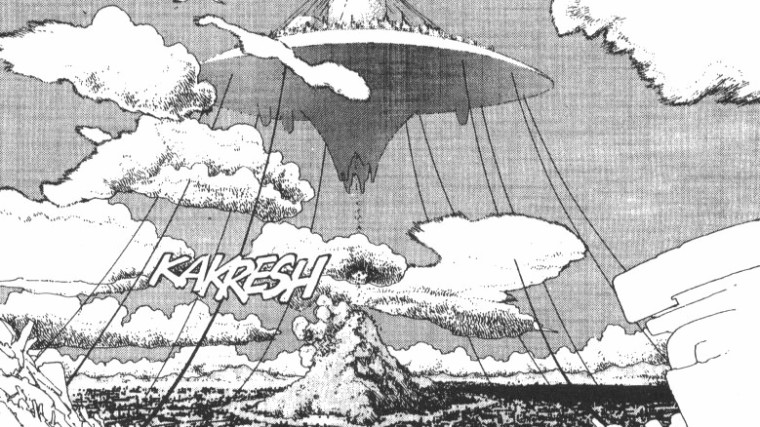 The utopian Tiphares (shown here in its manga depiction) from Battle Angel Alita needs the dystopia below it to thrive.
The utopian Tiphares (shown here in its manga depiction) from Battle Angel Alita needs the dystopia below it to thrive.
Although it deals in issues of technology and discrimination, the society in Eve no Jikan stands out as another nearly utopian depiction. Humans and robots live side by side in relative harmony, yet even here there's an underlying darkness in questioning how we treat AI. If Plato had imagined AI into his utopia, they might have solved that whole pesky slavery question; if we can get past the questions of whether technology can ever be equal to us.
More often than not, though, a utopia has to exist side by side with a dystopia to function. Battle Angel Alita's Tiphares is a utopian floating island that requires the terrible conditions of the forsaken land below it to survive.
So what is it about the dystopian society that makes it so much easier to imagine
Dystopia: Dysfunctional Perfection
If utopia is perfection, dystopia is anti-perfection. The term literally means "bad utopia," or even "anti-utopia." It's a dysfunctional society that no one in their right mind would want to live in.
Dystopia in Classic Literature
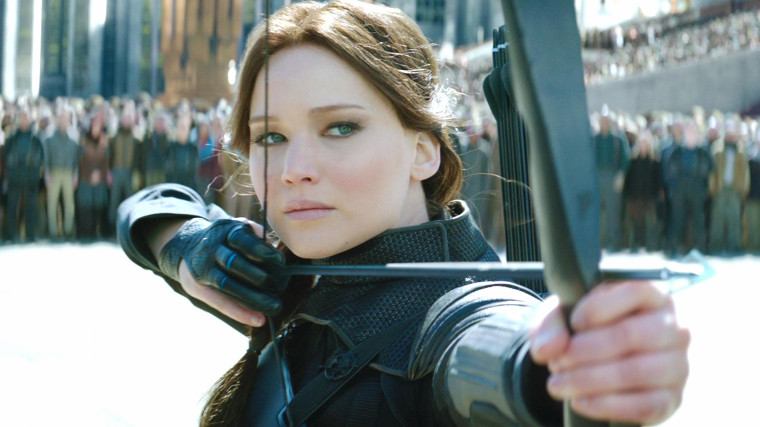 Still from The Hunger Games, everyone's current favorite dystopia.
Still from The Hunger Games, everyone's current favorite dystopia.
The term dystopia was coined by the philosopher John Stuart Mill in 1868, quite a while after More's creation of the word utopia. Unlike More however, Mill wasn't speaking about an imaginary place: he was criticizing the British government's treatment of Irish land.
Dystopias are much more prevalent in literature. They're usually set in the future, and feature totalitarian governments, inhuman treatment of citizens, and sometimes post-apocalyptic level of environmental destruction. Dystopias can serve as warnings: if you keep treating your environment/ government/fellow citizens the same way, look at the horror your society will turn into.
Using a utopia to show how terrible the real world is works just fine, but using a dystopia to scare readers into considering "what might be" is even more effective. Famous novels like George Orwell's 1984 and Aldous Huxley's Brave New World use dystopias to criticize society. If you slept those those books in school, you might recognize the classic recent example of a dystopia: The Hunger Games. A society that has a powerful elite that pits teenagers against each other to battle to the death is about as dystopian as it gets.
Dystopia in Anime
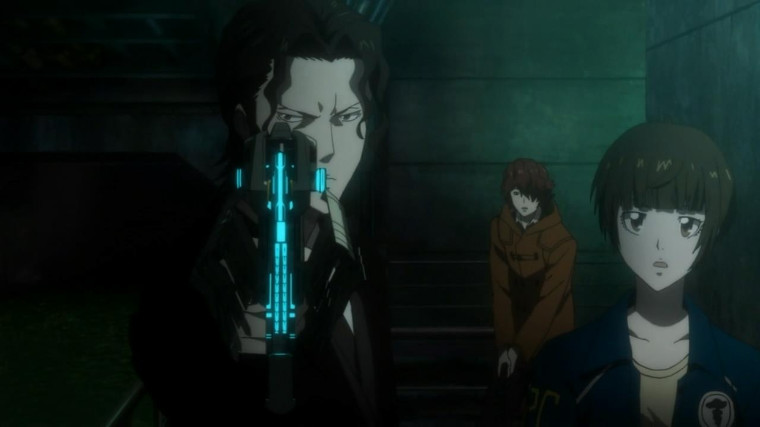 Don't even think of committing a crime in the world of Psycho-Pass. Literally.
Don't even think of committing a crime in the world of Psycho-Pass. Literally.
While it's hard to find examples of utopia in anime, it's hard to avoid examples of dystopia. The ruined post-apocalyptic world, the controlling government, the dysfunctional society can all be found in countless anime.
Take Psycho-Pass, for instance. In the near future, society has developed a method of reading people's intent to commit a crime. Crimes are prosecuted before they're even committed, changing the very definition of justice. It may sound ideal on paper, but in practice would lead to a world where you always feel watched. In this world, even your thoughts aren't safe from Big Brother.
An older example of a dystopia appears in Wolf's Rain, where the earth has been plunged into an era of poverty. Rumors of achieving utopia are ever out of grasp - according to legends, paradise can only be found through a species that is thought to be extinct. This dystopia is harsh - a glimmer of hope is dangled in front of a desperate society, then snatched away.
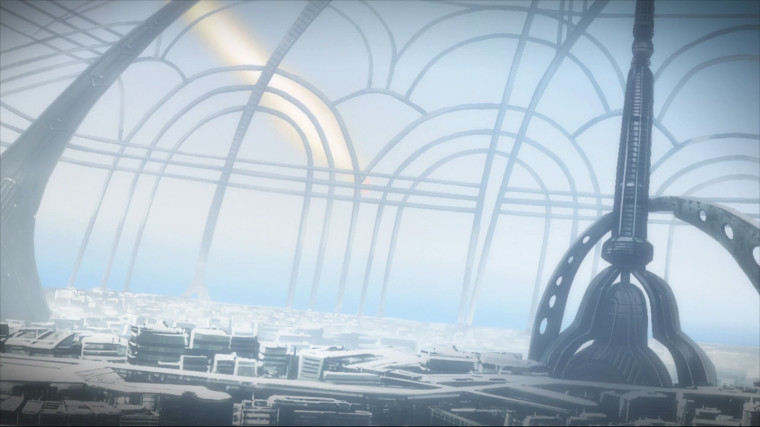 Apocalyptic conditions have led survivors to live in domed cities in Ergo Proxy.
Apocalyptic conditions have led survivors to live in domed cities in Ergo Proxy.
Another case of an earth practically destroyed by disaster is found in Ergo Proxy. This post-apocalyptic psychological anime features people living in tightly controlled domes scattered across a ravished landscape, with humanity hanging on by one final thread.
Unlike the list of utopian anime, this list goes on and on. Dystopian societies can be found in No. 6, Patema Inverted, Texhnolyze, and many others.
There's just something about a shattered society that strikes too close to home - and that makes watching these dystopian struggles appealing.

